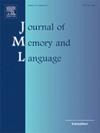The separability of early vocabulary and grammar knowledge
IF 3
1区 心理学
Q1 LINGUISTICS
引用次数: 0
Abstract
A long-standing question in language development concerns the nature of the relationship between early lexical and grammatical knowledge. The very strong correlation between the two has led some to argue that lexical and grammatical knowledge may be inseparable, consistent with psycholinguistic theories that eschew a distinction between the two systems. However, little research has explicitly examined whether early lexical and grammatical knowledge are statistically separable. Moreover, there are two under-appreciated methodological challenges in such research. First, the relationship between lexical and grammatical knowledge may change during development. Second, non-linear mappings between true and observed scores on scales of lexical and grammatical knowledge could lead to spurious multidimensionality. In the present study, we overcome these challenges by using vocabulary and grammar data from several developmental time points and a statistical method robust to such non-linear mappings. In Study 1, we examined item-level vocabulary and grammar data from two American English samples from a large online repository of data from studies employing a commonly used language development scale. We found clear evidence that vocabulary and grammar were separable by two years of age. In Study 2, we combined data from two longitudinal studies of language acquisition that used the same scale (at 18/19, 21, 24 and 30 months) and found evidence that vocabulary and grammar were, under some conditions, separable by 18 months. Results indicate that, while there is clearly a very strong relationship between vocabulary and grammar knowledge in early language development, the two are separable. Implications for the mechanisms underlying language development are discussed.
早期词汇和语法知识的可分离性
语言发展中一个长期存在的问题是早期词汇和语法知识之间关系的本质。这两者之间非常强的相关性导致一些人认为词汇和语法知识可能是不可分割的,这与避免区分这两个系统的心理语言学理论是一致的。然而,很少有研究明确地考察早期词汇和语法知识是否在统计上是可分离的。此外,在此类研究中存在两个未被充分认识的方法论挑战。首先,词汇和语法知识之间的关系在发展过程中可能会发生变化。其次,在词汇和语法知识的量表上,真实得分和观察得分之间的非线性映射可能导致虚假的多维性。在本研究中,我们通过使用来自多个发展时间点的词汇和语法数据以及对这种非线性映射具有鲁棒性的统计方法来克服这些挑战。在研究1中,我们检查了两个美国英语样本的项目级词汇和语法数据,这些样本来自使用常用语言发展量表的研究的大型在线数据库。我们发现明确的证据表明,词汇和语法在两岁时是可分离的。在研究2中,我们结合了使用相同尺度(18/19、21、24和30个月)的两项语言习得纵向研究的数据,发现在某些情况下,词汇和语法在18个月时是可分离的。结果表明,虽然词汇和语法知识在早期语言发展中明显存在很强的关系,但两者是可分离的。讨论了语言发展机制的含义。
本文章由计算机程序翻译,如有差异,请以英文原文为准。
求助全文
约1分钟内获得全文
求助全文
来源期刊
CiteScore
8.70
自引率
14.00%
发文量
49
审稿时长
12.7 weeks
期刊介绍:
Articles in the Journal of Memory and Language contribute to the formulation of scientific issues and theories in the areas of memory, language comprehension and production, and cognitive processes. Special emphasis is given to research articles that provide new theoretical insights based on a carefully laid empirical foundation. The journal generally favors articles that provide multiple experiments. In addition, significant theoretical papers without new experimental findings may be published.
The Journal of Memory and Language is a valuable tool for cognitive scientists, including psychologists, linguists, and others interested in memory and learning, language, reading, and speech.
Research Areas include:
• Topics that illuminate aspects of memory or language processing
• Linguistics
• Neuropsychology.

 求助内容:
求助内容: 应助结果提醒方式:
应助结果提醒方式:


